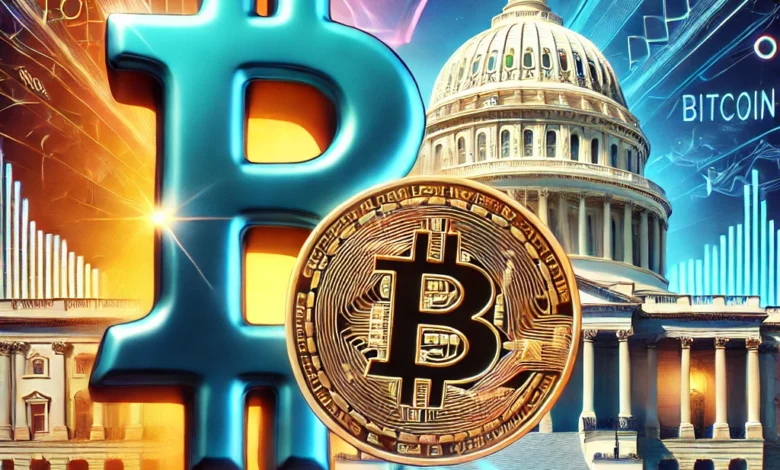US Sen. Cynthia Lummis: How Bitcoin Reserves Could Strengthen the Dollar
Embracing Cryptocurrency: Senator Lummis Advocates for Bitcoin to Bolster U.S. Financial Stability and Innovation

In a bold and unprecedented stance, U.S. Senator Cynthia Lummis has proposed the integration of Bitcoin into the U.S. financial system as a reserve asset. This proposition has sparked significant debate and interest, considering the transformative potential it holds for the future of the U.S. dollar and the broader economy. Sen. Lummis, a Republican from Wyoming, has long been an advocate for cryptocurrency, and her recent statements underscore her belief that Bitcoin could play a pivotal role in strengthening the U.S. dollar.
The Case for Bitcoin as a Reserve Asset
Sen. Lummis argues that Bitcoin, with its decentralized nature and limited supply, can serve as a hedge against inflation and economic instability. Unlike traditional fiat currencies, which can be printed in unlimited quantities, Bitcoin is capped at 21 million coins, making it a deflationary asset. This characteristic, Lummis contends, makes Bitcoin an ideal candidate for a reserve asset that can protect the value of the dollar.
“Bitcoin’s fixed supply and its nature as a decentralized digital currency make it a unique asset that can complement our traditional financial system,” Lummis stated in a recent interview. “By incorporating Bitcoin into our reserve assets, we can add a layer of stability and predictability to our economic framework.”
Senator Cynthia Lummis: “Having #Bitcoin in reserve can help the US dollar remain strong.”
— Rhino Bitcoin App (@RhinoBTCapp) July 12, 2024
pic.twitter.com/iClTXLKITj
Addressing Inflation Concerns
One of the primary motivations behind Lummis’s proposal is the growing concern over inflation. The U.S. has seen significant monetary expansion in recent years, particularly in response to economic challenges such as the COVID-19 pandemic. This expansion has raised fears of long-term inflation and the potential erosion of the dollar’s purchasing power.
Lummis believes that Bitcoin can act as a counterbalance to these inflationary pressures. By holding a portion of reserves in Bitcoin, the U.S. could mitigate the risk of inflation eroding the value of its assets. This strategy, she suggests, would provide a more robust financial cushion and enhance the credibility of the dollar.
Enhancing the Dollar’s Global Standing
The global financial landscape is increasingly competitive, with several countries exploring digital currencies and blockchain technology. China, for instance, has made significant strides with its digital yuan, positioning itself as a leader in the digital currency space. Lummis argues that integrating Bitcoin into the U.S. reserve strategy would not only fortify the dollar domestically but also bolster its standing on the global stage.
“Adopting Bitcoin as a reserve asset sends a strong signal to the world that the U.S. is at the forefront of financial innovation,” Lummis explained. “It positions the dollar as a modern, resilient currency that embraces new technologies while maintaining its historical strengths.”
Regulatory Considerations
For Lummis’s vision to become a reality, several regulatory and policy hurdles must be addressed. The integration of Bitcoin into the U.S. financial system requires a clear regulatory framework that ensures security, transparency, and compliance with existing financial laws.
Lummis has been actively working on legislative efforts to provide such a framework. She is a member of the Senate Banking Committee and has been a vocal advocate for clearer regulations surrounding cryptocurrencies. Her goal is to create an environment where digital assets can thrive without compromising the integrity of the financial system.
“Regulation is key to unlocking the potential of Bitcoin and other cryptocurrencies,” Lummis emphasized. “We need to provide clear guidelines that protect consumers and investors while fostering innovation and growth in the crypto space.”
Potential Risks and Challenges
While Lummis’s proposal has garnered support from various quarters, it is not without its critics. Skeptics argue that the volatility of Bitcoin poses a significant risk to its viability as a reserve asset. The price of Bitcoin has historically been subject to sharp fluctuations, raising concerns about the stability and predictability of reserves held in the cryptocurrency.
Additionally, there are concerns about the security of Bitcoin holdings. Despite its decentralized nature, Bitcoin has been the target of numerous cyberattacks and thefts. Ensuring the security of Bitcoin reserves would require robust infrastructure and stringent security measures.
Lummis acknowledges these challenges but believes they can be managed with the right approach. “Every asset class has its risks, and Bitcoin is no different,” she said. “However, with proper risk management and security protocols, we can harness the benefits of Bitcoin while minimizing its potential downsides.”
The Broader Impact on the Economy
The adoption of Bitcoin as a reserve asset could have far-reaching implications for the U.S. economy. It could drive further adoption of cryptocurrencies and blockchain technology, spurring innovation and investment in these sectors. This, in turn, could create new jobs and economic opportunities, contributing to overall economic growth.
Moreover, it could also influence the behavior of other countries and central banks. If the U.S. successfully integrates Bitcoin into its reserve strategy, it could set a precedent for other nations to follow suit. This could lead to a more diversified global financial system, with multiple reserve assets providing stability and resilience.
- Sen. Cynthia Lummis’s proposal to incorporate Bitcoin as a reserve asset represents a bold and forward-thinking approach to strengthening the U.S. dollar. By leveraging the unique properties of Bitcoin, Lummis believes the U.S. can enhance the stability and credibility of its financial system, addressing concerns about inflation and positioning itself as a leader in the digital currency space.
- While there are challenges and risks to be addressed, Lummis’s vision offers a compelling case for the potential benefits of Bitcoin integration. As the debate continues, it is clear that the future of the U.S. dollar and the broader financial landscape may be shaped by innovative and unconventional strategies, with Bitcoin playing a central role in this transformation.
- The dialogue initiated by Sen. Lummis highlights the evolving nature of finance and the need for adaptive policies that embrace technological advancements. Whether or not Bitcoin becomes a part of the U.S. reserve assets, the conversation itself is a testament to the growing influence of cryptocurrencies and the ongoing quest for financial stability and innovation.




